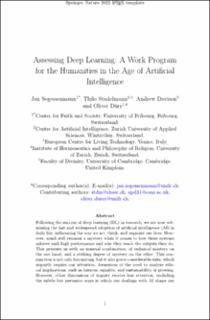Please use this identifier to cite or link to this item:
https://doi.org/10.21256/zhaw-28651Full metadata record
| DC Field | Value | Language |
|---|---|---|
| dc.contributor.author | Segessenman, Jan | - |
| dc.contributor.author | Stadelmann, Thilo | - |
| dc.contributor.author | Andrew, Davison | - |
| dc.contributor.author | Oliver, Dürr | - |
| dc.date.accessioned | 2023-09-14T08:34:42Z | - |
| dc.date.available | 2023-09-14T08:34:42Z | - |
| dc.date.issued | 2023-08-28 | - |
| dc.identifier.uri | https://papers.ssrn.com/sol3/papers.cfm?abstract_id=4554234 | de_CH |
| dc.identifier.uri | https://digitalcollection.zhaw.ch/handle/11475/28651 | - |
| dc.description | How to read this paper: It is structured in four modular parts: a general introduction (section 1), an introduction to the workings of DL for uninitiated non-technical readers (section 2), a more mathematical introduction to DL (appendix A), and a main part, containing the outlines of a work program for the humanities (section 3). Readers familiar with mathematical notions might want to skip 2 and instead read A. Readers familiar with DL in general might want to ignore 2 and A altogether and instead directly read 3 after 1. | de_CH |
| dc.description.abstract | Following the success of deep learning (DL) in research, we are now witnessing the fast and widespread adoption of arti cial intelligence (AI) in daily life, influencing the way we act, think, and organize our lives. However, much still remains a mystery when it comes to how these systems achieve such high performance and why they reach the outputs they do. This presents us with an unusual combination: of technical mastery on the one hand, and a striking degree of mystery on the other. This conjunction is not only fascinating, but it also poses considerable risks, which urgently require our attention. Awareness of the need to analyze ethical implications, such as fairness, equality, and sustainability, is growing. However, other dimensions of inquiry receive less attention, including the subtle but pervasive ways in which our dealings with AI shape our way of living and thinking, transforming our culture and human self-understanding. If we want to deploy AI positively in the long term, a broader and more holistic assessment of the technology is vital, involving not only scientic and technical perspectives but also those from the humanities. To this end, we present outlines of a work program for the humanities that aim to contribute to assessing and guiding the potential, opportunities, and risks of further developing and deploying DL systems. | de_CH |
| dc.format.extent | 90 | de_CH |
| dc.language.iso | en | de_CH |
| dc.publisher | SSRN | de_CH |
| dc.rights | Licence according to publishing contract | de_CH |
| dc.subject | Deep learning | de_CH |
| dc.subject | Anthropology | de_CH |
| dc.subject | Humanities | de_CH |
| dc.subject | Artificial intelligence | de_CH |
| dc.subject | Ethics | de_CH |
| dc.subject | Philosophy | de_CH |
| dc.subject.ddc | 006: Spezielle Computerverfahren | de_CH |
| dc.subject.ddc | 301: Soziologie und Anthropologie | de_CH |
| dc.title | Assessing deep learning : a work program for the humanities in the age of artificial intelligence | de_CH |
| dc.type | Working Paper – Gutachten – Studie | de_CH |
| dcterms.type | Text | de_CH |
| zhaw.departement | School of Engineering | de_CH |
| zhaw.organisationalunit | Centre for Artificial Intelligence (CAI) | de_CH |
| dc.identifier.doi | 10.21256/zhaw-28651 | - |
| zhaw.funding.eu | No | de_CH |
| zhaw.originated.zhaw | Yes | de_CH |
| zhaw.webfeed | Machine Perception and Cognition | de_CH |
| zhaw.webfeed | Datalab | de_CH |
| zhaw.webfeed | DIZH Fellowship | de_CH |
| zhaw.webfeed | ZHAW digital | de_CH |
| zhaw.funding.zhaw | Stability of self-organizing net fragments as inductive bias for next-generation deep learning | de_CH |
| zhaw.author.additional | No | de_CH |
| zhaw.display.portrait | Yes | de_CH |
| Appears in collections: | Publikationen School of Engineering | |
Files in This Item:
| File | Description | Size | Format | |
|---|---|---|---|---|
| 2023_Segessenmann-etal_Deep-learning-assessment-work-program-Humanities.pdf | 3.85 MB | Adobe PDF |  View/Open |
Show simple item record
Segessenman, J., Stadelmann, T., Andrew, D., & Oliver, D. (2023). Assessing deep learning : a work program for the humanities in the age of artificial intelligence. SSRN. https://doi.org/10.21256/zhaw-28651
Segessenman, J. et al. (2023) Assessing deep learning : a work program for the humanities in the age of artificial intelligence. SSRN. Available at: https://doi.org/10.21256/zhaw-28651.
J. Segessenman, T. Stadelmann, D. Andrew, and D. Oliver, “Assessing deep learning : a work program for the humanities in the age of artificial intelligence,” SSRN, Aug. 2023. doi: 10.21256/zhaw-28651.
SEGESSENMAN, Jan, Thilo STADELMANN, Davison ANDREW und Dürr OLIVER, 2023. Assessing deep learning : a work program for the humanities in the age of artificial intelligence [online]. SSRN. Verfügbar unter: https://papers.ssrn.com/sol3/papers.cfm?abstract_id=4554234
Segessenman, Jan, Thilo Stadelmann, Davison Andrew, and Dürr Oliver. 2023. “Assessing Deep Learning : A Work Program for the Humanities in the Age of Artificial Intelligence.” SSRN. https://doi.org/10.21256/zhaw-28651.
Segessenman, Jan, et al. Assessing Deep Learning : A Work Program for the Humanities in the Age of Artificial Intelligence. SSRN, 28 Aug. 2023, https://doi.org/10.21256/zhaw-28651.
Items in DSpace are protected by copyright, with all rights reserved, unless otherwise indicated.